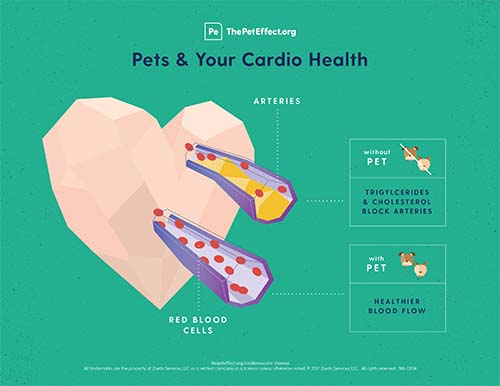Washington, D.C. (February 20, 2020) — Mars Petcare and the Human Animal Bond Research Institute (HABRI), with support from a broad consortium of partners, today released a report that offers a roadmap for advancing research and best practices that address how human-animal interaction can serve as an important solution to the growing epidemic of loneliness and social isolation.
“There is increasing evidence that pets can play an important role in helping people feel less lonely and more socially connected,” said Steven Feldman, Executive Director, HABRI. “Together with the leadership of Mars Petcare and a group of other experts and stakeholders, HABRI will work to address the crisis of loneliness in our society with the power of the human-animal bond.”
Loneliness currently affects three in five Americans[i] and 9 million people in the United Kingdom.[ii] Loneliness can be as deadly as smoking 15 cigarettes per day, making it a serious threat to public health.[iii] Mars Petcare and HABRI surveyed 2,000 people in the United States, finding that 85 percent of respondents believe interaction with companion animals can help reduce loneliness.[iv]
“We have a responsibility to take the scientific exploration further when evidence to date shows us that pets can be part of addressing such a significant societal issue,” commented Rena Crumplen, Global Vice President of Research and Development, Mars Petcare. “It’s important that we undertake rigorous studies to understand how companion animals may provide a benefit for those suffering from conditions associated with social isolation and loneliness.”
The new report, Addressing the Social Isolation and Loneliness Epidemic with the Power of Companion Animals, brings forward the recommendations from the Summit on Social Isolation and Companion Animals, along with the continued work of a broad consortium of human health advocates, mental health practitioners, veterinarians and human-animal interaction researchers. The report outlines the following three-pronged approach to facilitate the role of HAI and pet ownership in addressing social isolation and loneliness:
- Advance High-Quality Research: Advance human-animal interaction (HAI) research to glean a better understanding for whom and under what circumstances interactions with companion animals may be effective for alleviating social isolation and loneliness.
- Help Address Barriers and Provide Solutions: Identify ways to remove barriers to access for pet ownership and human-animal interaction for those who may face hurdles and stand to benefit most – including older adults and people with mental health challenges.
- Share and Support the Proliferation of Best Practices: Support and help advance best practices in HAI and for companion animal ownership that help prevent, reduce and mitigate social isolation and loneliness. Ensure animal-assisted interventions in approved settings – including hospitals, nursing homes and within our communities – are grounded in science, meet high standards of animal welfare, and have the broadest societal impact.
Organizations that have contributed to the report, through participation in the Summit and the ongoing consortium working groups, include:
- Alliance for Aging Research
- American Pet Products Association
- Animal Policy Group
- Association of American Veterinary Medical Colleges
- Association of Child Life Professionals
- Anxiety and Depression Association of America
- American Veterinary Medical Association
- Baltimore VA Medical Center
- Banfield Pet Hospital
- California State Polytechnic University
- Canine Companions for Independence
- Cummings School of Veterinary Medicine at Tufts University
- Depression and Bipolar Support Alliance, Chicago Headquarters
- Eunice Kennedy Shriver National Institute of Child Health & Human Development
- Florida State University
- Found Animals Foundation
- The Gerontological Society of America
- Guide Dogs for the Blind
- Humane Rescue Alliance
- International Council on Active Aging
- Mental Health America
- National Academies of Sciences, Engineering and Medicine
- National Association for Home Care & Hospice
- National Council on Aging
- North American Veterinary Community
- Petco Foundation
- Pet Industry Joint Advisory Council
- Pet Partners
- Purdue University College of Veterinary Medicine
- Sick Cells
- University of Maryland, Baltimore
- University of Pennsylvania, School of Veterinary Medicine
- University of Tennessee Institute of Agriculture, College of Veterinary Medicine
- Village to Village Network
- Virginia Commonwealth University
- Whistle
Click here to access: Addressing the Social Isolation and Loneliness Epidemic with the Power of Companion Animals. To learn more about research into the benefits of pets on loneliness, please visit www.waltham.com and www.habri.org. To learn more about the benefits of pets and how you can take action in your community so that more people and pets can live healthy lives together, visit www.BetterCitiesforPets.com.
For more information or to request an interview, please contact:
| Cherise Adkins
Edelman DC (202) 350-6685 |
Will Jobes
Edelman London +44 203 3047 2629 |
1. Cigna Ipsos USA loneliness survey. January 2020. Available here: https://www.cigna.com/newsroom/news-releases/2020/cigna-takes-action-to-combat-the-rise-of-loneliness-and-improve-mental-wellness-in-america
2. British Red Cross and Co-op Trapped in a bubble: An Investigation into Triggers for Loneliness in the UK. Conducted by Kantar Public. December 2016. Available here: https://www.redcross.org.uk/about-us/what-we-do/action-on-loneliness
3. Testimony before the US Senate Aging Committee, Julianne Holt-Lunstad, Ph.D., 2017; https://www.aging.senate.gov/imo/media/doc/SCA_Holt_04_27_17.pdf.
4. HABRI and Mars Petcare Loneliness and Social Isolation Study. Conducted by Edelman Intelligence. December 2018.
About Human Animal Bond Research Institute (HABRI)
The Human Animal Bond Research Institute (HABRI) is a not-for-profit organization that maintains the world’s largest online library of human-animal bond research and information; funds innovative research projects to scientifically document the health benefits of companion animals; and informs the public about human-animal bond research and the beneficial role of companion animals in society. For more information about HABRI, please visit www.habri.org.
About Mars Petcare
Part of Mars, Incorporated, a family-owned business with more than a century of history making diverse products and offering services for people and the pets people love, the 85,000 Associates in Mars Petcare are dedicated to one purpose: A BETTER WORLD FOR PETS. With 75 years of experience, our portfolio of almost 50 brands serves the health and nutrition needs of the world’s pets – including brands PEDIGREE®, WHISKAS®, ROYAL CANIN®, NUTRO™, GREENIES™, SHEBA®, CESAR®, IAMS™ and EUKANUBA™ as well as The WALTHAM Petcare Science Institute which has advanced research in the nutrition and health of pets for over 50 years. Mars Petcare is also a leading veterinary health provider through a network of over 2,000 pet hospitals including BANFIELD™, BLUEPEARL™, PET PARTNERS™, VCA™, Linnaeus and AniCura. We’re also active in innovation and technology for pets, with WISDOM PANEL™ genetic health screening and DNA testing for dogs, the WHISTLE™ GPS dog tracker, and LEAP VENTURE STUDIO accelerator and COMPANION FUND™ programs that drive innovation and disruption in the pet care industry. As a family business and guided by our principles, we are privileged with the flexibility to fight for what we believe in – and we choose to fight for: A BETTER WORLD FOR PETS.
Contact
Jamie Baxter
jamie@theimpetusagency.com
775.322.4022
###





